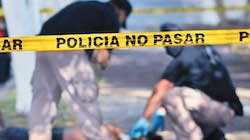A media investigation suggests that death squads, dressed as security forces, killed over a dozen people, and were not investigated by authorities.
The recent El Diario de Hoy investigation into 14 unresolved deaths in El Salvador suggests that these death squads may be systemically carrying out extrajudicial killings in areas controlled by the Mara Salvatrucha (MS13), one of two powerful gangs operating in El Salvador.
The victims range from suspected gang members — or “sympathizers,” as they are referred to in the story — to others who do not appear to have any gang affiliation.
SEE ALSO: El Salvador News and Profiles
In one such case, a death squad arrived at a house in the community of El Cedro, wearing police uniforms, identifying themselves as police and saying they were looking for weapons. The death squad then shot and killed one man after telling him they simply wanted to ask him some questions; they then followed that by killing two sisters in a separate house, the investigation alleges.
Salvadoran authorities have almost entirely ignored these cases, El Diario de Hoy said. Families of the victims say that neither the police, the Attorney General’s Office or Human Rights Ombudsman’s Office have investigated the deaths.
InSight Crime Analysis
It is difficult to dispute that death squads are now contributing mightily to historic homicide levels across El Salvador. This is the second such in-depth report on their operations. The first, by El Faro, chronicled a more generalized sensation and call for police to participate in these militias. (El Faro also chronicled a series of extrajudicial executions by police who allegedly staged the crime scene to look like a firefight with alleged gang members.)
SEE ALSO: Corruption in El Salvador: Politicians, Police and Transportistas
Still, no big case has resulted yet in police (or military) getting investigated or prosecuted for extrajudicial executions. A surge of gang killings by vigilante groups in 2014 sparked speculation about the role of death squads in extrajudicial killings, and although the Police Director Mauricio Ramirez Landaverde placed blame on the gangs themselves, the participation of police was not ruled out.
Landaverde has taken a similar stance on subsequent extrajudicial killings of suspected gang members, dismissing the involvement of police in death squads, while remaining open to the possibility that there are some death squads that are operational. But the lack of follow-up investigations by internal or independent bodies has made it difficult to pinpoint the sources of such violence.
Meanwhile, the “shoot first, ask questions later” policy of El Salvador’s police has heightened the climate of chaotic violence and extrajudicial killings. There were at least 676 homicides in October, more than double the level the year previous.

